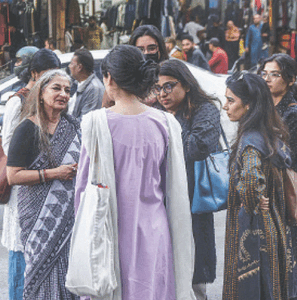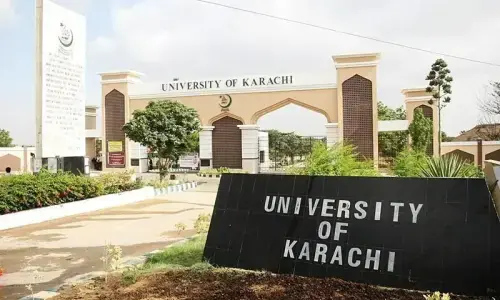KARACHI, June 26: The Patients’ Welfare Association, a non- political, non-governmental organization being run by the students of the Dow Medical College on the premises of the Civil Hospital Karachi, has been providing health-care services to deserving patients free of cost for the past 23 years.
The PWA was formed by three Dow Medical College students in 1979 with a single cabinet of medicines.
The PWA will organize a bake sale on Thursday, from 9.30am onwards, to generate funds that the Association uses to help the poor and deserving patients of the Civil Hospital.
According to a PWA audit statement, in 2001 the Association incurred an expenditure of over Rs12.6 million which was met by donations, Zakat, souvenir, interest profit and donation in kind.
Medical students associated with the PWA told Dawn on Wednesday that currently the Association ran five departments: the blood bank, the drug bank, the diagnostic laboratory, the TB follow-up clinic and the Thalassaemia clinic.
PWA volunteers explain that the drug bank accepts up to five applications per ward of the Civil Hospital Karachi every day. “Then, at noon, our workers go to each ward that has submitted drug requests and ensure that only authentic requests are fulfilled. The patients then come to the drug bank and collect their medicines. Sometimes, the medicine required by a patient is not present in our stock, so we buy it on the open market and provide it to the needy patient on time.”
They add, with well-earned pride, that recently the old premises of the drug bank was reconstructed which is now functional.
“The larger new drug bank allows the PWA to store more medications and that too in an organized manner,” PWA volunteers told Dawn, pointing to the various shelves where medicines of all hues remained stacked in a proper order.
The blood bank, established in 1982, issues 200 blood bags every day free of cost, each containing 450 millilitre of screened blood. The turnover of blood bags at the blood bank is the greatest in the city.
“The blood issued by the PWA blood bank is screened for HIV I & II, HCV (Hepatitis C virus), HBsAG (Hepatitis B) and STDs (sexually transmitted diseases). In principle, the PWA issues blood on an exchange basis: for one bag of blood issued the PWA received one bag which is afterwards screened and tested. But at times, in cases of emergency, the PWA issues blood without receiving anything in return,” PWA volunteers point out.
They add that if the donor’s blood has any of these viruses, then he/she is quietly informed and his blood sample is tested again, more vigorously. “His contact number is also forwarded to the AIDS department of the government if he is HIV positive on condition that his identity will not be disclosed.” Again with a sense of pride, PWA volunteers point out that the PWA blood bank is recommended by the World Health Organization for safe and screened blood.
The PWA diagnostic laboratory was set up in 1986 to perform the tests that are most commonly prescribed by doctors, such as blood sugar, blood urea, serum creatinine, serum electrolytes, serum calcium bilirubin, malaria parasite and prothrombin time.
“The PWA diagnostic laboratory, which has more than 800,000 tests to its credit, purchased a Selectra-E, an advanced clinical system, with which up to 250 tests could be performed in an hour. It also purchased a flame photometer. The PWA is all-set to purchase equipment for blood complete picture tests and lever function tests.”
PWA volunteers say that the TB follow-up clinic provides long-term TB treatment to over 200 patients completely free of cost. They point out that the complete treatment for TB takes nine to 12 months and the cost for the nine-month treatment is at least Rs6,000. “Two days a week a Civil Hospital doctor checks TB patients free of charge and provide medicines to them.”
Similarly, they say, the Thalassaemia follow-up clinic provides facilities of routine investigations, screened blood on an exchange basis and, when required, medication (prescribed by doctors) to Thalassaemia patients free of cost.
“At present, 150 patients are registered with the TB follow- up clinic and Thalassaemia follow-up clinic each. The PWA is planning to increase this number. Besides, it also provides long- term therapy for patients suffering from epilepsy, hypertension, asthma, and systemic lupus erythematosus.”

































